|

songs | interviews | photos | tours | boots | press releases | timeline
Women Who Rock magazine (US)
January/February 2004

Tori Amos
Tori sings in her brilliant ballad "Northern Lad," "I guess you go too far / When pianos try to be guitars," but we forgive her. It's the going too far that makes her a musical priestess to so many. In this exclusive interview, Tori tells the tales of her life as a healer, a mother, and um, a librarian.
Brilliant All These Years
A new retrospective of re-recorded classics and rare tracks, Tales of a Librarian illuminates the dazzling artistry of Tori Amos, piano goddess extraordinaire.
By Dianne Spoto Shattuck
Earth Mother. Musical Priestess. Mystical Faerie. Sexual Healer. These are but a few of the titles bestowed upon Tori Amos by fans and press over her 12-year career. Rising amid the flannel shirt-clad, angsty truthsayers of the grunge-filled 90's, Tori took a seat along side them, complementing the stormy sounds of the era with her own innovative approach. With the U.K. release of her Atlantic debut, Little Earthquakes, in 1991 (and subsequent American release in '92), Tori singlehandedly brought back the lost art of songwriting and piano-based music from the '70s, fusing it with a post-feminist vigor.
When Tori first appeared on the scene, she was frequently compared to Kate Bush in vocal style and writing technique. Though that early influence is obvious, Tori evolved over the years into an unparalleled artist in her own right, influencing many of today's young singer-writer-pianists.
The daughter of a Methodist minister, Tori was born on August 22, 1963 and grew up in the Baltimore area. A child prodigy, she was enrolled at the esteemed Peadbody Conservatory at 5 years old. By the age of 13, Tori was playing bars and piano lounges--protected and chaperoned by her minister dad--then made her way to L.A. after high school to pursue a career in rock. After an unsuccessful stint with the overproduced hair band Y Kant Tori Read, Tori moved to the U.K., worked on developing an authentic voice, and released the confessional Little Earthquakes to rave reviews. The a cappella track "Me and a Gun" candidly tells the story of her horrifying rape. Though her heart-wrenching honesty, she became a healer to many.
"Music has always been healing for me, since I was little," Tori explains during a phone interview from Cornwall, England, where she lives with husband and sound engineer Mark Hawley and their 3-year-old daughter, Natashya. "I can really be in pain, then listen to or play music, and I feel things ... ease. I feel the music play me, so that I become an instrument it plays."
This music that "plays" Tori can be divided into three distinctive elements. The first element is her deeply personal and notoriously cryptic lyrics, which can often stand alone as complete poems, reminiscent of e.e. cumming's work in terms of their metaphorical poignancy and avant-garde use of language. The second element is her inescapably classical approach of piano playing. Her atmospheric, lilting style is achieved through her deft finger technique--an approach that many have tried to emulate over the years. And finally, there is the element of her voice. With its peculiar and haunting tone, Tori's voice is a breathy, sensual conduit through which her lyrics are gracefully transported. Refined into a flexible instrument of wide range over the years, Tori's voice can convey both the intimacy of a lover's whisper and the punishment of their rage in a single song.
Needless to say, she's become irresistable to her passionately loyal legion of fans, with whom she has a very intimate relationship. Tori is one of the few major-label artists to court her fans personally, such as hosting "Meet & Greets" outside the backstage door of every concert hall she plays. With the Novemeber 2003 release of her first greatest hits album, Tales of a Librarian, Tori felt compelled to create an out-of-the-box compilation exclusively for her fans.
"Every night they come to the shows and bring me their own mix tapes of my songs that they've created. I think they do it in some ways better than what the record company can do," she laughs. "So I thought, 'What did we have that we could offer?' We had access to the original multi[track]s. We can do so much more now than we could in 1992 in terms of how vocals [are] recorded. With today's technology that's come so far in the last 10 years, we can kind of reapproach the recordings. The instruments and the vocals [of the originals] have so much more help now." Indeed, the songs on Tales do sound dramatically enhanced--classics like "Crucify" and "God" have added reverb and delay on the vocals, creating a lush, cushiony soundscape that wasn't there before.
Another inspiration behind Tales was the idea of creating a "sonic biography, rather than just random tunes," Tori explains. "Perhaps [my daughter] Tash's grandchildren are gonna listen to this in a hundred years' time. I wanted to chronicle the turning of the century for them, as well as this woman's life that we call 'Tori.' Instead of it just being a 'Best-of,' I wanted it to be a 40-year span of how she saw things." As she elaborates on the idea of a sonic autobiography, Tori begins speaking about herself in the third person. "She's born into feminism -- thank heaven -- and she benefited from the women that went before her. She grew up a minister's daughter. I felt we had to include songs that really express these parts of me."
Daring to delve shamelessly into taboo subjects like rape, religion, sexuality, miscarriage, and some deeply emotional breakup experiences, Tori has become a spokesperson for those that personally relate to these topics. However, she is modest, and quick to give the songwriting credit to the songs themselves. "I feel like I plug in and interpret the songs. I co-create with them, but they're their own consciousness, and they have their own relationships with individual people that are different from my relationship with them." Tori has often referred to her songs as "girls," and talks about them as if they are living, breathing friends of hers, rather than inanimate works of art she has created. "Sometimes, my role is to just try to craft these girls and interpret and develop them. I see them, but sometimes it's hard for me to crack who exactly they are."
When asked about songwriting influences, Tori quickly dodges the question. "I listen to music, but I don't listen to it over and over and over, because you don't want any one song to seep in too much." She pauses. "You don't want to start stealing. Inspiration is one thing, and I'm inspired a lot by other musicians' choices, but you don't want to confuse their song for yours -- that is not your wife."
Today's technology has influenced not only Tori's production techniques, but also her listening choices. "We have a system installed at the studio with thousands of songs through the iPod technology. The system goes through the studio, to the offices, to the kitchen -- through the whole compound. These are things from the whole crew's collections over the years -- it's a vast sonic library. The guys are referencing them all the time. I hear things that I've never heard before. And I enjoy that, because my choices wouldn't be that at all. Has that affected me? Sure, it opens you up." She continues, "I'm exposed to all kinds of music, all kinds of artists -- and a lot of people wouldn't think that I'm actually listening to them, but I am. I'm listening to all of you."
In addition to the vast music collection she listens to, her latest songwriting inspiration is her daughter. "[Motherhood] is a great teacher," she says. "Mothers have to hold themselves accountable all the time, because you're shaping a life. A child is different than when you put a lover or a relationship at the center, because they cannot survive without you. You can't just leave them at the end of the lane and think they're gonna be okay. They're not gonna be okay. So, just your free time ... even if you're traveling with them, somebody has to be responsible all the time. But motherhood can feed your art and performance and your energy level. Motherhood is demanding and exhausting, but it's also the most rewarding thing ever."
~ ~ ~
Tori's Tales
The Artist's Super-Personal Take on Some of Her Timeless Tunes
God
Will you even tell her if you decide to make the sky fall? / Will you even tell her if you decide to make the sky? / God sometimes you just don't come through / Do you need a woman to look after you? / 'Cause God sometimes you just don't come through
"The woman in this song, the voice of this song, was really about a consort of God. That's the one song where, in all my work, I'm exploring God's lover. And I'm not talking about Mary the mother, or Mary who got 'impregnated' by God. I'm talking about--if we pull back and look at Christian mythology, and the idea that there is a god, why wouldn't there be a goddess? In all of nature, there is not a male-only speicies. There has to be a female and a male."
Mr. Zebra
Hello Mr. Zebra / Ran into some confusion with a Mrs. Crocodile / Furry mussels marching on / She thinks she's Kaiser Wilhelm / Or a civilized syllabub / To blow your mind
"I refer to a 'Mrs. Crocodile' in that song. Sometimes I disguise the people I'm writing about with made-up characters, because they don't even know they're in the songs. And that's how it has to stay. So instead of calling them by their real name, because they have these certain [negative] traits. I'll call them something else, like a 'Mrs. Crocodile.'"
Show Cherries from France
And then one day he said / "Girl it's been nice / Oh, but I have to go sailing." / With cinnamon lips that did not match his eyes / Oh then he let me go
"I started writing this song in 1996 to '97. It's been a long time coming. I think it finally came together because I changed the narrator's point of view ever so slightly. That is, that she knew on some level that he was going to leave her. The previous angle was that she didn't think he would go. She came into it a lot more naive the first go 'round. And finally, once I kind of cracked who this woman was--how she thought, and how she felt--it came together. That is, that deep down, she knew he was a wanderer. And she took the risk anyway."
Cooling
So then Love walked up to Like/ And said "I know that you don't like me much, let's go for a ride" / This ocean is wrapped around that pineapple tree / And is your place in heaven worth giving up these kisses / These, yes, these kisses
"I usually try not to define my lyrics too much. I think it's really important that people find it in their own way. But when I wrote 'Cooling," I had been in Hawaii, and I was really on a sensory level with pineapples--the smell of them--they had an effect on me while I was there. I sound like I'm talking a load of gibberish, but I don't want to start talking about who it is I'm referring to in that song. That's why I thought it was best to keep it in that metaphorical world."
original article
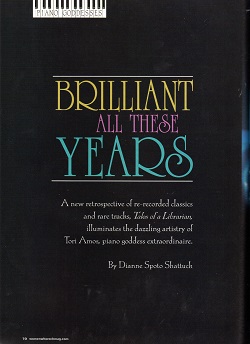 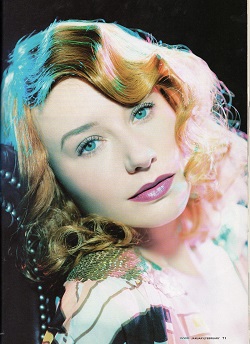
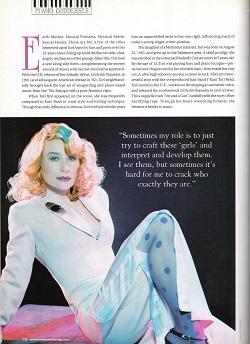 
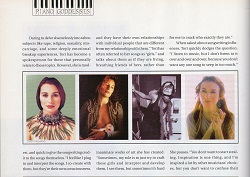 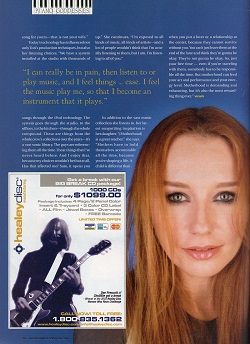
[scans by Sakre Heinze]
t o r i p h o r i a
tori amos digital archive
yessaid.com
|